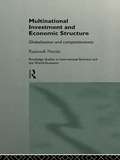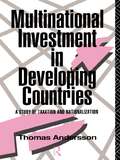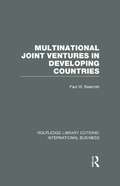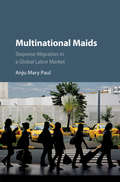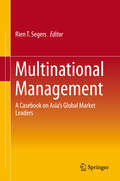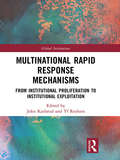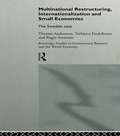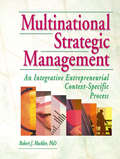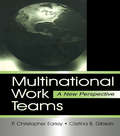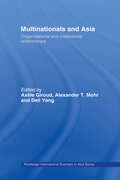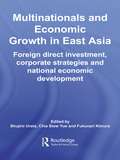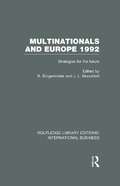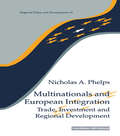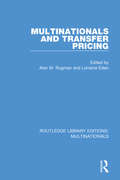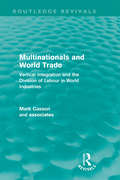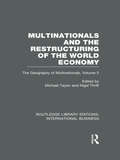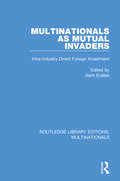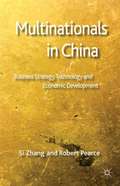- Table View
- List View
Multinational Investment and Economic Structure: Globalisation and Competitiveness (Routledge Studies in International Business and the World Economy)
by Rajneesh NarulaMultinational Investment and Economic Structure examines the relationship between industrial development and foreign direct investment (FDI) activities, and the interaction between multinational (MNE) activity and economic structures. It deals with the changing structure of the world economy as a whole, and the dynamics of the relationship between industrial development and the extent of FDI activities across countries. It evaluates the concurrent (and interrelated) evolutionary processes behind economic growth and MNE activity and how these evolutionary forces impact on the economic structure of individual economies in the industrialised world as their economies converge through globalisation.
Multinational Investment in Developing Countries: A Study of Taxation and Nationalization
by Thomas AnderssonThis book explores the struggle for gains from direct investment between multinationals and developing countries. It discusses which policies work best in influencing the behaviour of MNEs and how developing countries compete with one another for multinational investment. It argues that the tax regimes of different countries rarly deter investors but that nationalisation acts as a powerful disincentive. It also concludes that governments should not be expected to sacrifice the environment to attract multinationals.
Multinational Joint Ventures in Developing Countries (Routledge Library Editions: International Business)
by Paul BeamishThis book examines how joint ventures work in practice. Drawing on extensive personal experience and using case study examples where appropriate the author analyses the various stages, discusses the problems of partner selection, implementation and control and points out the various benefits and pitfalls. He draws out the implications for improving practice and discusses how the experience of joint ventures affects the theory of the multinational enterprise.
Multinational Maids: Stepwise Migration in a Global Labor Market
by Paul Anju MaryMultinational Maids offers an in-depth investigation into the international migrations of Filipino and Indonesian migrant domestic workers. The author taps on her rigorous study of more than 1,200 subjects' migration trajectories to reveal how these migrants work in a series of overseas countries to improve their lives and, in some cases, seek permanent residence in another country. Challenging the portrayal of Asian migrant domestic workers as victims of globalization, Multinational Maids reveals migrants' agency and strategic thinking under conditions of constraint. At the market level, the establishment of guestworker programmes for migrant domestic workers in multiple countries has created a global labour market. A transnational diaspora shapes migrants' evolving destination imaginaries, while manpower recruitment and placement agencies create transnational mobility structures. In addition, differing destination hierarchies and degrees of access to resources lead to the adoption of divergent stepwise trajectories. Written in an accessible manner, Multinational Maids appeals to migration scholars, policymakers, activists and students.
Multinational Management
by Rien T. SegersThis casebook demonstrates that the future of global business lies in how well the multinational landscape is charted and how the importance of Asian market leaders is deeply embedded in it. It offers international management students and researchers an extensive guide to the business history, strategy development, and foreign market entry modes used by emerging Asian multinationals. The cases focus on well-known companies such as Lenovo, Alibaba, Infosys, Huawei, Panasonic, and Rakuten. These companies, all of which generate huge revenues in their own countries (e. g. in China, India, South Korea, Taiwan, Vietnam), are now becoming increasingly sophisticated and striving to become global brands, while also enjoying the active support of their governments in terms of their international business. Readers will learn about the current multinational landscape in Asia, the management challenges, and the future implications for traditional western companies seeking to retain their market share. Chapters on corporate entrepreneurship, human resource management and intercultural competence, and current branding trends in Asia will provide a cutting-edge update on international business strategy for students and practitioners alike.
Multinational Rapid Response Mechanisms: From Institutional Proliferation to Institutional Exploitation (Global Institutions)
by John Karlsrud Yf ReykersThe track record of military rapid response mechanisms, troops on standby, ready to be deployed to a crisis within a short time frame by intergovernmental organizations, remains disappointing. Yet, many of the obstacles to multinational actors launching a rapid and effective military response in times of crisis are largely similar. This book is the first comprehensive and comparative contribution to explore and identify the key factors that hamper and enable the development and deployment of multinational rapid response mechanisms. Examining lessons from deployments by the AU, the EU, NATO, and the UN in the Central African Republic, Mali, Somalia and counter-piracy in the Horn of Africa, the contributors focus upon the following questions: Was there a rapid response to the crises? By whom? If not, what were the major obstacles to rapid response? Did inter-organizational competition hinder responsiveness? Or did cooperation facilitate responsiveness? Bringing together leading scholars working in this area offers a unique opportunity to analyze and develop lessons for policy-makers and for theorists of inter-organizational relations. This work will be of interest to scholars and students of peacebuilding, peacekeeping, legitimacy and international relations.
Multinational Restructuring, Internationalization and Small Economies: The Swedish Case (Routledge Studies in International Business and the World Economy)
by Thomas Andersson Torbjorn Fredriksson Roger SvenssonFirst published in 1995. Routledge is an imprint of Taylor & Francis, an informa company.
Multinational Retailers and Consumers in China
by Jos GambleRising prosperity and a rapidly commercializing economy have transformed post-Mao China into the world's largest and most rapidly growing emerging market. Until the early 1990s, its retail sector remained largely closed to overseas retailers. Since then, this sector has gradually opened to foreign involvement, a process boosted by China joining the World Trade Organization in 2001. China now constitutes an increasingly significant market for overseas retailers. Based upon extensive first hand comparative research conducted at multinational retailers from the United Kingdom and Japan, this book investigates the transfer of parent country organizational practices by these retailers to their Chinese subsidiaries. Providing insights into employment relations in multinational retail firms as well as changing labour-management systems in China, this book delineates some of their impactson consumer culture in a developing country. "
Multinational Service Firms: International Business - Multinational Service Firms (Routledge Library Editions: International Business)
by Peter EnderwickThis book presents a world survey of multinational firms in the key parts of the service sector. The service sector has grown greatly in importance in recent years in many countries of the world. Many of the key parts of the service sector that are growing most rapidly are dominated by large multinational firms and this has important implications for the future shape of the world economy and for closer economic integration between countries. In addition, the particular style and operations of multinational firms in one sector can provide useful lessons for multinational enterprise in other sectors. The book examines the operations and the style of the firms considered and explores how they dominate their sectors. It charts how the firms have developed, discusses the critical issues facing them; and suggests how present trends may continue in the future.
Multinational Strategic Management: An Integrative Entrepreneurial Context-Specific Process
by Erdener Kaynak Robert Mockler Dorothy G DologiteBuild the skills needed to compete in the highly competitive global business environment!This incisive book is a comprehensive introduction to contemporary multinational strategic leadership and management. A vital guide to business policy, Multinational Strategic Management: An Integrative Entrepreneurial Context-Specific Process combines basic strategic management with a distinctive international business perspective. The result is invaluable as a preparatory overview for novices and as a guidebook for business practitioners.Mixing basic management and leadership perspectives with a study of international business, Multinational Strategic Management takes a comprehensive approach to subjects that traditionally require multiple texts. Designed for use as a textbook for undergraduate and graduate course work, the book fills an educational void in a rapidly growing field. The in-depth text provides you with a thorough understanding of how to lead and manage enterprises that operate within and across national borders.Multinational Strategic Management helps professionals, students, and educators: acquire and enhance skills in entrepreneurial contingency thinking and action integrate those skills to creatively handle specific situations learn more about management processes (and possibly develop new ones)Ideal for use in support of executive training workshops and as a text in advanced university business programs, Multinational Strategic Management introduces you to all levels of integrative decision-making from the entrepreneurial perspective of the leading multinational firms like General Electric and Intel. Perfect for educational use, the book provides more than the standard textbook descriptions and case studies. It will inspire the kind of creative entrepreneurial thought and action needed to compete in today&’s highly competitive global environment.
Multinational Work Teams: A New Perspective (Organization and Management Series)
by P. Christopher Earley Cristina B. GibsonThis authored book's purpose is to extend and consolidate the evolving literature on multinational work teams by developing a comprehensive theory that incorporates a dynamic, multilevel view of such teams. The model used by the authors focuses on various features of the team's members, their interactions as a team, and the organizational context in which they operate. The concept of integration and differentiation, as well as the notion of equilibrium are used as a general force guiding the specific processes that link various levels of analysis in the model. Providing a framework for scholars and students in the field of organizational studies, this book presents: *a comprehensive review of the literature related to multinational and multicultural teams; *an overview of the specific model driving our thinking along with an extensive description of the component parts; *the individual and group-level elements of teams and their members; *the linking processes that connect various elements and structures; *the catalysts that give rise to changes in various elements and structures described in the theory section; and *a general integration of the model and an application of this framework for understanding MNT's in diverse cultural contexts.
Multinationale Unternehmen aus Schwellenländern und Europa: Herausforderungen und Strategien
by Andreas Nölke Louis Brennan Johannes Jäger Andreas Breinbauer Andreas G. M. NachbagauerIn letzter Zeit hat die Öffentlichkeit Bedenken hinsichtlich der Auswirkungen multinationaler Unternehmen aus Schwellenländern geäußert. Die Expansion chinesischer multinationaler Unternehmen nach Europa und die Belt and Road Initiative ist ein prominentes Beispiel, das Hoffnung geweckt hat, aber auch das Bewusstsein für die langfristigen Auswirkungen geschärft hat. Auf der Grundlage einer systematischen Analyse von Internationalisierungstheorien, der Rolle ausländischer Direktinvestitionen und multinationaler Unternehmen in Verbindung mit eingehender empirischer Forschung anhand von Fallstudien in der Türkei, Russland, Lateinamerika, Asien und Europa befasst sich dieser aktuelle Sammelband mit den Chancen und Bedenken im Zusammenhang mit diesem neuen Trend. Darüber hinaus liefert er neue Erkenntnisse, die für Wissenschaftler, politische Entscheidungsträger, regionale Wirtschaftsagenturen und Studenten sowie für die breite Öffentlichkeit von großer Bedeutung sind. Durch die Konzentration auf die (potenziellen) Auswirkungen der Expansion multinationaler Unternehmen aus Schwellenländern auf Europa und die Einbeziehung einer langfristigen Perspektive bietet das Buch eine neue Sichtweise auf ein äußerst kontroverses Thema.
Multinationals and Asia: Organizational and Institutional Relationships (Routledge International Business in Asia)
by Deli Yang Axéle Giroud Alex MohrAdopting an international business perspective, this book surveys recent business developments in Asia, and the activities of multinational firms in the region, focusing in particular on the changing nature of organizational and institutional relationships, including intra- and inter- organizational relationships, business relationships with institutions, and relationships with stakeholders. The international team of contributors discuss the current and future trends in a wide range of business sectors across the region, as well as assessing how the nature of multinationals' activities in the region is changing as the business environment evolves and becomes more globalized.
Multinationals and Cross-Cultural Management: The Transfer of Knowledge within Multinational Corporations (Routledge International Business in Asia)
by Parissa HaghirianGlobalisation makes our world appear smaller: it is easier to connect, communicate and do business with people all over the world. But cultural differences remain and challenge globalized knowledge communication and transfer. This book examines cross-cultural management within multinational enterprises (MNEs), focusing in particular on how cultural differences influence the transfer of knowledge between different units within individual corporations. Based on detailed empirical analysis of 267 companies in Germany and Japan, it considers the relative effectiveness of inter-cultural and intra-cultural knowledge transfer; identifies the factors that inhibit or facilitate successful knowledge transfer; and suggests how management processes of MNEs can be improved. It demonstrates that although cultural differences do not necessarily influence the selection and transmission of knowledge overseas, they do have a strong impact on how that knowledge is received, integrated and put into practice locally. The book shows how knowledge is accepted differently in Europe and Asia and which factors have the strongest impact on efficient knowledge transfer. It suggests that to improve cross-cultural management MNEs should focus less on upgrading the technology that allows knowledge transfer, and more on the capabilities and beliefs of individual employees.
Multinationals and Economic Growth in East Asia: Foreign Direct Investment, Corporate Strategies and National Economic Development (Routledge International Business in Asia #Vol. 3)
by Fukunari Kimura Shujiro Urata Chia Siow YueDeveloping countries in East Asia recorded remarkable economic growth until the Asian financial crisis erupted in mid-1997. Although several countries experienced devastating setbacks, most of them recovered to achieve reasonable rates of economic growth over the next few years. Sound macroeconomic management, export-oriented policies, and the availability of skilled and low-wage labour are among the factors that contributed to the rapid economic growth before the crisis and the recovery thereafter. Especially noteworthy in this regard is the role played by foreign direct investment (FDI). This comprehensive book identifies the factors that contributed to the expansion of FDI inflows in East Asia and the factors that enabled recipient countries to utilize FDI effectively. It includes detailed case studies on China, South Korea, Taiwan, Indonesia, Malaysia, the Philippines, Singapore, Thailand and Vietnam. Also included is a comparative study of investing firms headquartered in the United States, Japan and Hong Kong. The authors conclude that social stability, clear and effective policy implementation and corporate governance are all key factors in reaping economic success from FDI.
Multinationals and Europe 1992: Strategies for the Future (Routledge Library Editions: International Business)
by B. Burgenmeier J. L. MucchielliWhen it was originally published this book presented the first independent review of the critical role played by multinationals in Europe. Extending its focus beyond 1992, the book examines both the economic and business strategy frameworks the firms need to develop to maintain a competitive advantage. Using case-studies from specific industries, it looks not only at the activity of multinationals within the single market but explores the competitive strategies of non-European firms with special emphasis on Japanese companies which were poised to exploit 1992. The importance of interaction between multinationals and national government policies is also analysed taking into account the integration already achieved.
Multinationals and European Integration: Trade, Investment and Regional Development (Regions and Cities)
by Nicholas A. PhelpsThis book examines the role of the multinational firms in processes of European integration. It is primarily concerned with the implications of market integration and industrial restructuring for peripheral European regions. Nicholas Phelps argues that, because of the complex relationship between competition and economies of scale, the persistence of market segmentation, and because of the embeddedness of multinational investment in established production locations, there is considerable inertia in the existing trade and investment patterns of multinationals in the EU. This argument is explored empirically in relation to multinationals operating in Wales. This study suggests that processes of restructuring accompanying market integration are slow to take effect and based on a diversity of motives.
Multinationals and Global Consumers
by Geng Cui T. S. ChanaInternational business (IB) research on Asian firms is on the rise, focusing on Japan, China and other countries and potentially enriching theory development and practice. The rise of Asian firms has challenged conventional theories and provided opportunities for IB researchers to address several paradoxical issues such as ownership advantage, risk-return, and the flying geese hypothesis. Moreover, researchers would benefit from paying attention to multi-level analysis, the role of history 'vis-a-vis' culture, and the variance across countries at different levels of economic development. Multinationals and Global Consumers is a collection of articles written by leading scholars on IB research in Asia and addresses some of these problems in several key areas of IB research including Multinationals and Organizational Management, International Business and FDI, Marketing and Consumer Behavior, and furnish meaningful implications for practice and future research.
Multinationals and Transfer Pricing (Routledge Library Editions: Multinationals)
by Alan M. Rugman and Lorraine EdenOne of the reasons for the success of multinational enterprises in their ability to create in their supranational organisations "internal markets" which eliminate the imperfections of external world markets caused by tariffs on trade, restrictions on the flow of capital, information costs and so on. The method multinationals use to create and sustain internal markets is transfer pricing. Multinationals use to their advantage the difference between nominal accounting and real transfers from their head offices to a subsidiary in different countries to overcome transaction costs and restrictions on trade and capital flows. This book, first published in 1985, examines these and other aspects of multinationals’ use of transfer pricing. It puts forward original thinking and research findings by leading experts in this area. Empirical results are related to the activities of multinationals in less developed countries. This volume covers the economic theories of transfer pricing, accounting and fiscal practices and implications for government policies and regulations, and will be of interest to students of economics and business studies.
Multinationals and World Trade: Vertical Integration and the Division of Labour in World Industries (Routledge Revivals)
by Mark CassonFirst published in 1986, this work reports the results of the Leverhulme project on multinationals and intermediate product trade based at the University of Reading during the academic year 1982/3. Chapter 1 summaries the main results of this project. Part I focuses upon the theoretical component of world trade, dealing with both the theories of division of labour and vertical integration. Part II presents a number of specially-commissioned case studies relating to the project, concerning the motor industry, the bearing industry, the synthetic fibre industry, the tin industry, the copper industry, the banana industry and the shipping industry.
Multinationals and the Restructuring of the World Economy: The Geography of the Multinationals Volume 2 (Routledge Library Editions: International Business)
by Michael Taylor Nigel ThriftThis volume charts the ways in which multinational corporations contributed to the restructuring of the world economy, paying particular attention to the spatial consequences of, and responses to, their operations at a number of scales. The book takes as its theme the differential spatial outcomes of the restructuring of different types of multinational corporation.
Multinationals as Mutual Invaders: Intra-industry Direct Foreign Investment (Routledge Library Editions: Multinationals Ser.)
by Asim ErdilekOne surprising development in the growth of multinational businesses and international trade is the large and growing amount of intra-industry direct foreign investment. Intra-industry direct foreign investment is the phenomenon whereby multinationals from two countries have overseas manufacturing operations in each other’s countries. The phenom
Multinationals in China
by Robert Pearce Si ZhangMultinationals, China and the Global Economy analyses the results of an in-depth survey of subsidiaries in China of leading manufacturing multinational enterprises (MNEs). It investigates the strategic roles played by these subsidiaries and the sources of technologies they access or generate in doing this. It provides an original contribution to the understanding of important issues in international business, the economic development of China and economics. In international business this study extends our knowledge of MNEs' global strategies through detailed analysis of the precise roles they expect their subsidiaries in China to play. A central theme of this is how these roles relate to the development of the Chinese economy and help its positioning in the global economy. Using the results of their survey, the authors analyse how MNEs are operating within the reorientation of Chinese development from low-cost exporting to an innovation-oriented and knowledge-driven economy. A very distinctive response to the growing Chinese market, and its changing patterns of consumer demand, emerges as a crucial factor at the core of this.
Multinationals in Emerging Markets: Making the Right Strategic Choices in the Face of Insufficient Institutional Support
by Tarun Khanna Krishna G. PalepuEmerging markets are playing pivotal roles in the strategies of multinationals based in developed markets-and have for some time. Despite the advantages enjoyed by these multinationals-in scale, brand recognition, technology, etc.-these companies face two major challenges in emerging markets: the prevalence of institutional voids-or the absence of key intermediary institutions like credit card systems, market regulation, and intellectual-property adjudication-and the new class of nimble, ambitious local competitors that are quickly developing world-class capabilities. To succeed, and seize competitive advantage, multinationals must adapt to and shape institutional voids. But how? In this chapter, two experts in emerging market strategy describe the strategic choices available to multinationals and demonstrate how companies like GM, McDonald's, Microsoft, and Monsanto have confronted and responded to institutional voids-and won. This chapter was originally published as Chapter 4 of "Winning in Emerging Markets: A Road Map for Strategy and Execution."
Multinationals in Latin America
by Leonardo Liberman Sergio Garcilazo Eva StalThe book deals with cases about the impact of, and interaction between, the different Latin American cultural, economic, legal, and political settings on activities, strategies, structures and decision-making processes of MNCs. The cases focus on business processes, settings and organizational behavior in Latin America.
